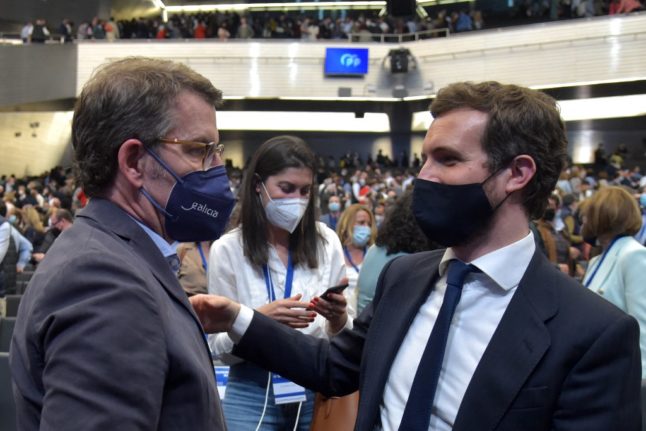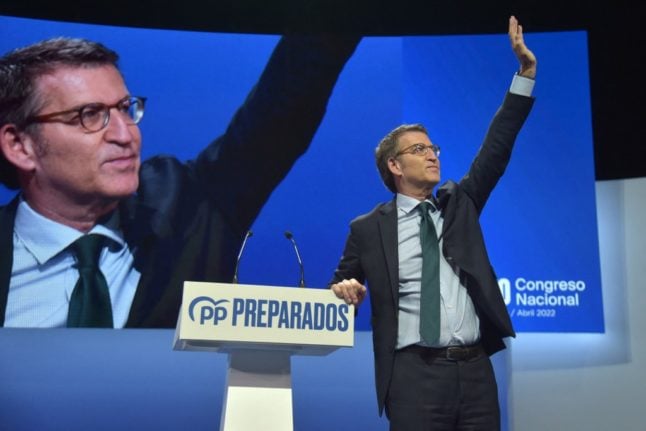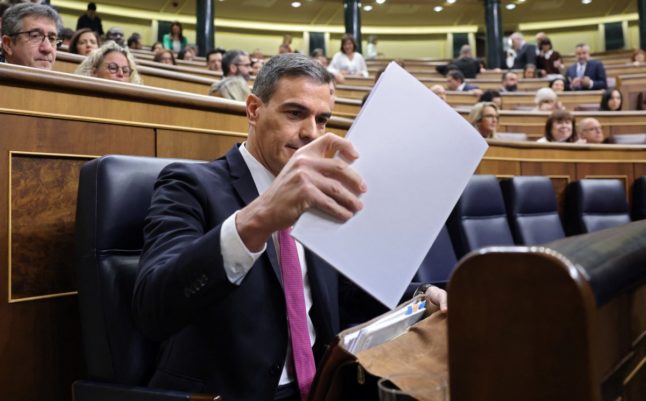After 13 years governing Galicia in northwestern Spain with a track record of four absolute majorities, the party is hoping the 60-year-old will be able to translate his regional success to a national level.
Feijoo said he would fight to return the right-wing party to power and warned he would not be a pushover.
“Moderation is not about being lukewarm and dialogue is not submission,” he said after being elected leader with 98.3 percent of the votes at a two-day party congress in Seville.
Grazas por tanto. https://t.co/OmyN5ztfVd
— Alberto Núñez Feijóo (@FeijooGalicia) April 2, 2022
“Enough of the heated debates and confronting each other, enough of creating problems, there are already so many… Let’s end these futile debates and face the real problems,” Feijóo told delegates.
“I’m not here to insult (Socialist Prime Minister Pedro Sanchez) but to beat him.”
European Commission Vice President Margaritis Schinas, a guest at the congress, said he had full confidence in Feijóo.
“Alberto knows the path to victory very well because if there’s one thing he knows about, it’s winning elections,” he said in fluent Spanish.
The Spanish premier congratulated Feijóo on his appointment, tweeting: “In these complex times, working with unity and responsibility for the common good must be a priority for everyone.”
Enhorabuena a @FeijooGalicia por su elección como presidente del Partido Popular.
En estos tiempos complejos, trabajar con unidad y responsabilidad por el bien común de la ciudadanía debe ser una prioridad de todos y todas.
— Pedro Sánchez (@sanchezcastejon) April 2, 2022
Moving past a crisis
The Galician leader was the only candidate running to take over from Pablo Casado, who was edged out following a bitter internal dispute with one of the party’s rising stars.
When he took over as PP chief in July 2018, Casado was a young hardliner who promised to breathe new life into a party snarled in corruption and bleeding votes.
But barely four years later, the 41-year-old was left fighting for his political life after a very public confrontation with Isabel Diaz Ayuso, whose success as Madrid regional leader threw his own lacklustre leadership into sharp relief.
Casado told the gathering on Friday that he was giving up his seat in parliament and quitting all “positions of responsibility” in the PP. “It is best if I step aside,” he said.

Two former PP prime ministers also spoke at the two-day gathering: Jose María Aznar, who was premier between 1996-2004, and Rajoy, who served between 2011-2018. Both urged party members to rally around Feijóo.
“I ask everyone for the greatest unity and the clearest support for this new stage of our party,” said Aznar speaking by video link because he has Covid-19.
Feijóo v. Vox and the Socialists
Feijóo is the only one of Spain’s regional leaders to govern with an absolute majority in a region where the Socialists pose no threat and the far-right party Vox has made no headway despite its growing popularity across Spain.
But at a national level, the scene is the opposite, and Feijóo will have to contend with a Socialist-led government, its hard-left partner Podemos and Vox in the ascendency.
During his long political career, Feijóo has steered clear of scandal, despite the emergence of photos from the mid-90s showing his friendship with a cigarette smuggler later jailed for drug trafficking. While admitting they were friends at the time, Feijóo said he had no idea about the illegal activities.
During a national tour to present his candidacy, Feijóo made a few slips, including a reference to the government as “autistic” for which he later apologised to those with the condition.
General elections are due by the end of 2023 but Pedro Sanchez’s left-wing coalition is already worn out by the pandemic, soaring inflation and social unrest over spiralling prices as well as the global uncertainty caused by the war in Ukraine.
The far-right has also been a headache for the PP, which has watched how Vox has, within eight years, managed to obtain 52 of the 350 seats in Spain’s parliament as its own showing has fallen from 186 to 88.
Feijóo’s job is now “to attract the centrist voters” that brought the PP’s Aznar and Rajoy to power, said Ernesto Pascual, a political scientist at Barcelona’s Autonomous University.
Even if the PP does succeed in next year’s election, recent polls suggest it could need the support of Vox to govern.
Alarm bells sounded last month when the PP made a coalition deal with Vox, letting the far-right faction into a regional government for the first time, raising fears it could be a blueprint for future power-sharing, both regionally and nationally.
READ MORE:



 Please whitelist us to continue reading.
Please whitelist us to continue reading.
Member comments